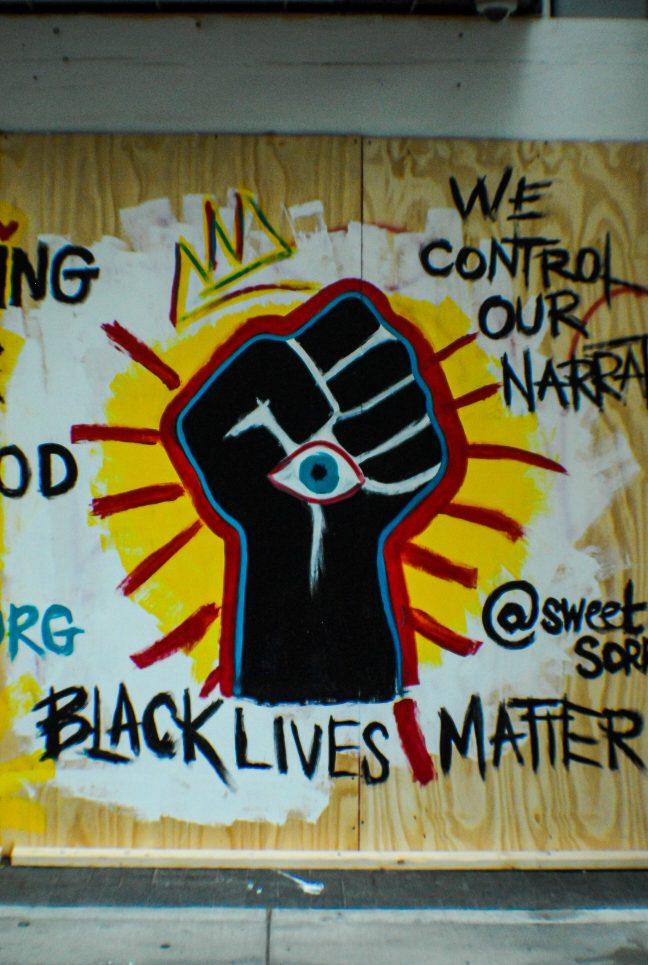At the top of Observatory Drive, about a hundred feet from the road, sits a giant 70-ton boulder known as Chamberlin Rock, named after renowned glacial geologist and former University of Wisconsin President Thomas C. Chamberlin. But that is not the name it always bore.
When Chamberlin Rock was unearthed from the side of Observatory Hill in 1925, it was colloquially referred to with a racial slur. It is this history that has prompted groups like the Wisconsin Black Student Union and LINK Madison to call for its removal, WBSU treasurer Nzinga Acosta said.
“This rock and the history that it holds is a representation of oppression, of discrimination and of hurt,” Acosta said. “And so in the removal of it, it’s a show that that type of behavior and that type of history is not going to be tolerated.”
Impact Demand hosts third night of protests after Jacob Blake shooting
UW Tribal Relations Office Director Aaron Bird Bear, who discusses the rock’s offensive nickname during his regular cultural landscape walking tours of campus, wrote in an email that UW’s staff found one instance of the offensive term in a 1925 Wisconsin State Journal article about the unearthing and subsequent relocation of the boulder. The reporter used the offensive term as a generic reference to the geological feature. A year after the newspaper article was published, the rock was named after Chamberlin.
Bird said because the monument itself is of concern and not Chamberlin himself, UW Chancellor Rebecca Blank is in the process of finding other potential means to honor the former UW president.
“The only hindrance right now is figuring out what to do with the plaque that is on the rock because it commemorates the history of Chamberlin,” Acosta said. “As soon as there is a concrete plan on where that plaque will end up, they’re 100% on board with removing the rock, from what they’ve told us.”
Acosta said she wants to see it replaced with a monument to Black students and the contributions of the Black community.
According to UW, the rock was carried near to its current location by the massive glaciers that once covered the landscape. It likely originated in northwest Michigan or northeast Wisconsin, but may come from as far as Canada.
Public historian at UW’s History Department Kacie Lucchini Butcher said she believes it is important to realize that instances of racism do not happen in a vacuum, but rather in a larger societal framework which supports inequality and actively works for white supremacy.
“Having the conversation about why was that term used, how it was used and who was using it, and whether it was widespread not only illuminates that time period for us, but also the ways that racism is on our campus,” Butcher said. “I think that the conversations about the instances are actually the most important part, because we’re not only learning lessons, but we’re also trying to understand our community and our history.”
Butcher said she was hired by the university roughly a year ago to conduct a project about UW’s history of racism and discrimination as well as resistance toward it by members of the community. The project was born as a follow up to a UW report which looked at the history of the Ku Klux Klan at UW. The report prompted UW to further investigate its entire history of racial discrimination.
Wisconsin, UW chapters of College Democrats plan reforms to tackle internal racism
This month, the project released its annual report, which dove into several instances of racism, but also moments which prompted members of the UW community to rally together against perceived bigotry.
“Some of my favorite stories I think are the ones where you see students really rallying around each other,” Butcher said. “For example, one of our students researched the founding of the Chicano Latino Studies program. This wasn’t something that just happened — the right students came together and fought for this department really hard for years.”
In addition to the removal of Chamberlin Rock, WBSU and LINK. Madison also called for the removal of the Abraham Lincoln statue on top of Bascom Hill for his stances and policies the groups consider anti-Black and anti-Native.
Protesters march down State Street to protest police brutality, white supremacy at UW
In 1862, Lincoln declined to commute the death sentences of 38 Dakota Sioux warriors in what became the largest mass execution in U.S. history. The warriors fought in the Dakota uprisings in response to hunger, privation and numerous treaty violations by the federal government.
“It’s opened up a really important conversation,” Butcher said. “Our history is not as easy, it’s not simple and it’s not as nice as we’ve been taught. Lincoln, like everybody else, has an extremely complicated legacy and I think that the conversations around that complicated legacy are really important.”
Butcher said she believes her role as a historian is to provide people with historical context and then leave it up to the public to have conversations on how to move forward. She added that decisions about removing monuments do not have to be left to historians.
To have those conversations, WBSU demanded Chancellor Blank hold an audience with Black students through a town hall meeting to hear their experiences and advice on how to make the campus a safer, more supportive place for them, Acosta said. But she added that she was disappointed in the university’s response.
“The response was not something that could move us forward in any way, and a lot of it was shutting it down, to put it quite frankly,” Acosta said. “It felt dismissive, but we are continuing to push to make sure that administration hears us.”


















